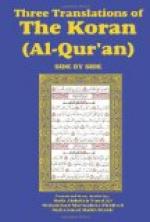54 See Sura [lxxiii.] xvi. 121, n., p. 209.
55 Ibn Batutah assures us (vol. ii. 10) that when in the 14th century he visited Basra, he saw in the mosque the copy of the Koran which the Caliph Othman had in his hands when murdered, and that the marks of his blood were still visible at the words of this verse. Othman’s originals are also said to be preserved in Egypt, Morocco, Damascus, Mecca, and Medina. See M. Quatremere in Journ. Asiatique, Juillet, 1838.
56 The original simply has Baptism of God. This may be understood either of Islam generally, or, with Ullmann, in the more restricted sense of circumcision. Perhaps Muhammad used the word advisedly as a hint to the Christians of his land, that in the reception of his religion consisted the true new birth.
57 Or, intermediate, i.e., according to the commentators, not addicted to excess, just. Ullm. ein vermittelndes Volk, zwischen Juden und Christen die Mitte haltend.
58 In having prayed towards Jerusalem.
59 Of Mecca. This change of the Kebla from Jerusalem to Mecca shows that this part of the Sura was revealed at a time when the breach between Muhammad and the Jews was past healing; i.c. in the first half of the second year of the Hejira. See Thilo’s. Cod. Apoc. p. 21, n.
60 That is, the Jews are really convinced of the truth of Muhammad’s mission.
61 That is, warring with the infidels. The precise date of verses 148-152 depends upon whether this passage refers to the battle of Bedr or Ohod.
62 These words are constantly used by the pious Muslims when in any trouble.
63 Hills in the sacred territory of Mecca, which had long been objects of superstitious reverence to the idolatrous Arabs, on which account the Muslims were at first unwilling to include them among the sacred places.
64 The Pentateuch. See verse 141.
65 This and the three following verses are probably Meccan, as also verses 167-171.
66 The ringleaders of infidelity and idolatrous faiths.
67 Freyt. Lex. vol. ii. p. 477 Quid eos agere coegit quemadmodum damnati agunt? But Mar. Quanta erit sustinentia corum!
68 To whom his brother, that is, any Arab or believer, shall remit the penalty of death.
69 Of the stricter Mosaic lex talionis, as well of the ante-Islamitic Arabian custom, by which the killing of a slave was avenged by the death of a free man, and the killing of a woman by taking the life of a man. See Freyt. Einl. p. 193. Comp. Ex. xxi. 23.
70 That is, by killing the manslayer.
71 On the word Furquan, see Sura [1xv.] xxi. 49.
72 A mutual comfort to each other.
73 Thus Misch. Berachoth, 1, 2, “Prayer is to be said as soon as one can distinguish between a blue and white thread.”
74 Judging from the minuteness of the precepts laid down in this and the following verses to 193, it would appear that they were added at a late period of Muhammad’s residence at Medina.




